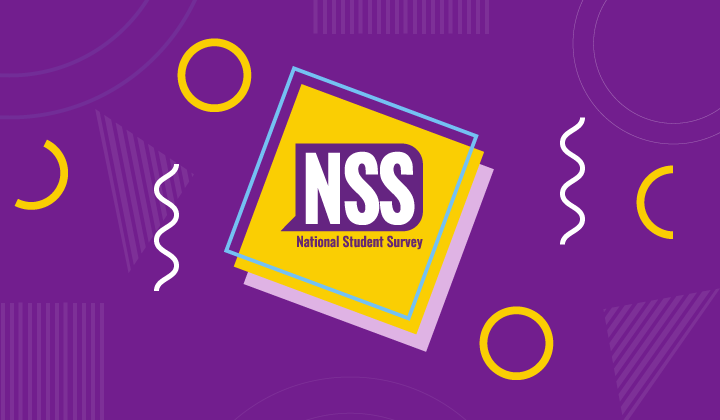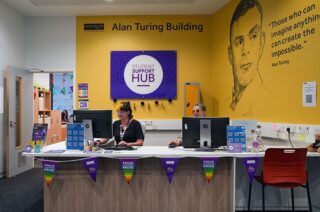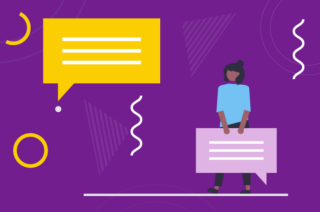Improving our student experience

Our students tell us that most of our teaching delivery is excellent through mechanisms like the UEQs, but the 2024 National Student Survey (NSS) results show no significant improvement in the students’ evaluation of their overall experience from the previous year. They continue to be particularly critical of Assessment & Feedback and the Student Voice. The NSS is important as it reflects our students’ view of their experience in Manchester and gives the external perception of that experience.
From analysis of NSS results in recent years, the University has identified 15 NSS actions that will provide a foundation to improving our NSS performance, and map well onto actions around student experience we have already been making in recent years. Colleagues in Departments, Schools, the Faculty, and the Students’ Union have been involved in defining the standardised implementation of these actions, and these actions will be progressed at Faculty, School, Discipline and unit level.
We are delighted to report that implementation of the 15 NSS Actions has been completed by the deadline of 31 January, with all FSE disciplines completing all actions.
Clarity of Marking Criteria and Communication
Communicate Marking Criteria
Ensure marking criteria are well-defined, provided at the start of the unit, included in standardised assessment briefs, and accessible online.
Faculty Implementation
All units have an ‘Assessment and Feedback’ folder in their Blackboard space – the marking criteria are clearly signposted within this. This folder contains the assessment brief (standardised Blackboard/Canvas format across the school). Rubrics for all unit assessments presented in a standardised format. Data taken from Slate (course unit information repository) directly or PDFs generated from Slate.
Key Updates (January 2025)
Implementation of this action has now delivered by the Disciplines. Assessment information is clearly signposted within each unit to ensure students have clear and consistent access to the information that they need to complete their assessments and understand how and when to expect feedback.
Implementation of this action has been assured through a combination of unit coordinator self reporting, Year Tutor and Discipline Head of Education (DHoE) checks, and manual checks on Blackboard spaces by professional services staff. Validation of this implementation will continue throughout February to ensure that Semester 2 courses are compliant with the action plan.
Assessment Criteria Discussions
Offer opportunities for students to discuss and ask questions about marking criteria at the start of the unit, before assessments, and after the first assessment.
Faculty Implementation
All units have a Blackboard Discussion Board to support discussion of marking criteria before and after first assessment. Unit Coordinators (UCs) must respond to assessment queries in this channel. There can be a Discussion Board dedicated to assessment or an assessment topic area within a more general unit Discussion Board.
Key Updates (January 2025)
Disciplines have now reported that this action has been successfully implemented and Discussion Boards are now clearly visible within each Blackboard space. This enables students to raise assessment queries and ensures response rates in a timely manner.
Implementation of this action has been assured through a combination of: unit coordinator self-reporting, Year Tutor and DHoE checks, and manual checks on Blackboard spaces by professional services staff. Validation of this implementation will continue throughout February to ensure that Semester 2 courses are compliant with the action plan.
Clarification Opportunities
Create a local system for students to seek clarification about marking criteria throughout the unit.
Faculty Implementation
Highlight the discussion board to students, before and after the first assessment, and throughout the semester (lectures, emails, newsletters). Each unit allocates some question time in a teaching session for assessment queries.
Key Updates (January 2025)
Disciplines have now reported that this action has been successfully implemented. Similar to the above, this is reiterated via clear signposting on Blackboard spaces and via teaching sessions.
Implementation of this action has been assured through a combination of: unit coordinator self-reporting, Year Tutor and DHoE checks, and manual checks on Blackboard spaces by professional services staff. Validation of this implementation will continue throughout February to ensure that Semester 2 courses are compliant with the action plan.
Timely Feedback
Feedback Deadlines
Clearly communicate and publish feedback deadlines and timelines.
Faculty Implementation
The assessment map must include submission dates, and feedback publication dates. The assessment map for each unit will be published at the start of each semester in a Blackboard community space, with clear signposting. Existing maps from last year’s NSS action plan are acceptable if all required information is present. The assessment map will include information on where / when the feedback can be used / actioned, e.g. “feedback from CW1 can be used for CW2”. The FSE Programmes / Options / Assessment (POA) Review will implement early unit formative/summative assessment.
Key Updates (January 2025)
This action has been delivered for all Disciplines. We will continue to develop and enhance presentation of this information to meet students needs. Implementation of this action has been assured by Discipline Heads of Education and Assessment Leads.
Timely Feedback Standards
Discuss and agree with students what constitutes timely feedback, considering factors affecting deadlines or causing delays, and actions to address them.
Faculty Implementation
Feedback policy communication campaign to be repeated, for both staff and students. Details to be added to Blackboard community space. Discuss policy and feedback process (including any delays) at SSLCs. Track any feedback delays in disciplines (using existing Assessment & Progression processes where possible). Address any delays using the established escalation route.
Key Updates (January 2025)
Outstanding actions have now been completed and this has been fully implemented across each Discipline. Assurance of this has been confirmed by Discipline Heads of Education and School Information, Advice and Guidance Teams.
Understanding and Use of Feedback
Feedback Purpose
Clearly explain the purpose of assessment and feedback, focusing on actionable guidance for improving future work and on general contribution to learning and understanding.Discuss and agree with students what constitutes timely feedback, considering factors affecting deadlines or causing delays, and actions to address them.
Faculty Implementation
Same as for Action 5. For each unit, a detailed document, or video or lecture podcast in the Blackboard space explaining assessment and feedback opportunities (summative and formative).
Key Updates (January 2025)
| This has been implemented across each Discipline, students now have access to information explaining assessment feedback opportunities, both summative and formative. Implementation of this action has been assured through a combination of: unit coordinator self-reporting, Year Tutor and DHoE checks, and manual checks on Blackboard spaces by professional services staff. Validation of this implementation will continue throughout February to ensure that Semester 2 courses are compliant with the action plan. |
Feedback Resources
With the exception of MCQ summative assessments, examination script viewing sessions will be offered for all units (including resits) and model answers will be provided for the AY2324 in the Assessment and Feedback Blackboard folder. Examination script viewing process and timetable will be reviewed by the schools. MCQ summative assessments must be supported with samples of questions (with solutions) assessing each of the Intended Learning Outcomes.
Faculty Implementation
Examination script viewing sessions offered for all units. Model answers (including for MCQs) to be provided for AY2324 in the Assessment and Feedback Blackboard folder. Examination script viewing process and timetable will be reviewed by the schools.
Key Updates (January 2025)
| Implementation will be delivered in the semester 1 exam script viewing sessions in March. A process has been established to give students access to solutions to support feedback opportunities. Model solutions have been gathered from Discipline Heads of Education to assist this. In addition to the School managing the above process, assurance that unit coordinators are also providing exam revision support has been established via DHoE checks and Unit Lead self-reporting forms. |
Feedback Usefulness
Engage with students to assess the usefulness of past feedback and collaboratively enhance it for future assignments.
Faculty Implementation
Standing item at all Student Voice Committees. Student reps. to collate feedback on feedback usefulness. Discuss best practice for feedback at Faculty Forum.
Key Updates (January 2025)
This action has been delivered.
This is now part of business as usual and is closely monitored by our Information, Advice and Guidance Teams in conjunction with DHoEs and SVC leads.
Student Representation and Engagement
UMSU Student Representatives
Ensure UMSU student representatives are known to the rest of the student cohort and staff. Students / student representatives are to be members of all Programme and School Boards.
Faculty Implementation
List names and contact details in Blackboard community spaces. Reinforce invitations to relevant boards, committees and forums at faculty, school and discipline levels.
Key Updates (January 2025)
| This action has now been delivered. In all cases we have listed the names and contact details in Blackboard community spaces. We have now ensured that we have representation at all School boards, committees and forums. This has been assured by our DHoEs and the IAG team. |
Engage with Student Groups
Speak to student groups to improve visibility of feedback actions and demonstrate how their input is valued and acted upon.
Faculty Implementation
Covered in Welcome Week talks for new and returning students. Include “How do I provide feedback” guidance in Blackboard community spaces. Include link to Student Voice webpage from Blackboard community spaces.
Key Updates (January 2025)
Student Voice section has been added to Departmental newsletters and moved to a prominent position to make it visible. ‘You said, we did’ item added to close feedback loop on actions from Student Voice Committees.
This has been assured by our DHoEs and IAG team
Communication and Student Voice Feedback
Communicate Student Voice Feedback
Share the importance of regular student voice feedback and explain the faculty/school/department feedback loop at the start of the academic year, embedding this regularly in lecture/seminar material.
Faculty Implementation
Every Student Voice Committee will have a standing agenda item on feedback. Student Voice Committees will discuss how to improve visibility of feedback actions.
Key Updates (January 2025)
All Student Voice Committees have a standing agenda item on feedback and will discuss how to improve visibility of feedback actions. This can be monitored by the Student Voice Committee’s trackers. This was implemented by School Information, Advice and Guidance teams.
Regular Feedback Updates
Provide at least three updates per semester (at programme, School and / or Faculty level) through digital communications, newsletters, school semester reports, posters, or within lectures/seminars on changes implemented based on student feedback.
Faculty Implementation
Each Discipline will publish student newsletters three times each semester. This will be supported by the IAG teams. Each unit will report on changes made in response to student feedback.
Key Updates (January 2025)
This has now been actioned for every Discipline. We are working our Faculty Communications team to deliver further enhancements to this action.
Maintain Student Voice Feedback Tracker
Keep a visible tracker, accessible to students and staff, on key student feedback and subsequent actions, monitoring progress.
Faculty Implementation
Implement Student Voice Committee action tracker for Student Voice Committees and host Student Voice Committee minutes on Student Voice webpage. We will monitor Student Voice Committee action trackers to ensure that feedback loops are being closed.
Key Updates (January 2025)
All SVC trackers are set up and operational. Currently shared with students via relevant Blackboard Community Spaces. Faculty Student Voice Webpage is now live.
Student Voice Feedback Opportunities
Mid-course unit feedback opportunities
Implement mid-course unit feedback opportunities for all students alongside UEQS. Provide a clear chance for students to comment, showing their opinions are valued and changes will be made without requiring a full questionnaire.
Faculty Implementation
Continue practice of issuing mid-semester (Week 4) surveys. Ensure there is a communication plan to accompany the surveys and that there is a published (Week 6) response to feedback from these surveys.
Key Updates (December 2024)
All student feedback, from mid-semester surveys, has been issued to Disciplines to comment on and take action where relevant. Communications have been sent to students drafted by the Faculty Communications team and a video by the SU Officer to close feedback loop with students
Regular Student Voice Feedback Sessions
Establish regular feedback sessions at Faculty and ideally School levels (for instance, through the existing Faculty Forum model) to provide updates, actions, and outcomes of previous feedback.
Faculty Implementation
Student Experience and Graduate Outcomes (SEGO) team to deliver Faculty Forums once per semester, in partnership with the SU.
Key Updates (November 2024)
Semester 1 Forum took place on 6 November. The report will be drafted and disseminated to appropriate stakeholders. Semester 2 Forum currently scheduled for 26 February.


